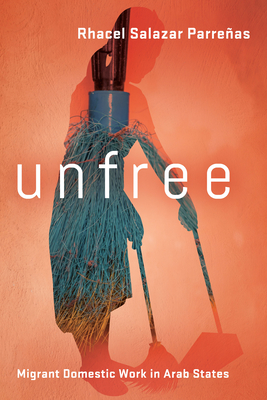Unfree: Migrant Domestic Work in Arab States

Unfree: Migrant Domestic Work in Arab States
A stirring account of the experiences of migrant domestic workers, and what freedom, abuse, and power mean within a vast contract labor system.
In the United Arab Emirates, there is an employment sponsorship system known as the kafala. Migrant domestic workers within it must solely work for their employer, secure their approval to leave the country, and obtain their consent to terminate a job. In Unfree, Rhacel Salazar Parreñas examines the labor of women from the Philippines, who represent the largest domestic workforce in the country. She challenges presiding ideas about the kafala, arguing that its reduction to human trafficking is, at best, unproductive, and at worst damaging to genuine efforts to regulate this system that impacts tens of millions of domestic workers across the globe.
The kafala system technically renders migrant workers unfree as they are made subject to the arbitrary authority of their employer. Not surprisingly, it has been the focus of intense scrutiny and criticism from human rights advocates and scholars. Yet, contrary to their claims, Parreñas argues that most employers do not abuse domestic workers or maximize the extraction of their labor. Still, the outrage elicited by this possibility dominates much of public discourse and overshadows the more mundane reality of domestic work in the region. Drawing on unparalleled data collected over 4 years, this book diverges from previous studies as it establishes that the kafala system does not necessarily result in abuse, but instead leads to the absence of labor standards. This absence is reflected in the diversity of work conditions across households, ranging from dehumanizing treatment, infantilization, to respect and recognition of domestic workers.
Unfree shows how various stakeholders, including sending and receiving states, NGOs, inter-governmental organizations, employers and domestic workers, project moral standards to guide the unregulated labor of domestic work. They can mitigate or aggravate the arbitrary authority of employers. Parreñas offers a deft and rich portrait of how morals mediate work on the ground, warning against the dangers of reducing unfreedom to structural violence.
PRP: 173.60 Lei
Acesta este Prețul Recomandat de Producător. Prețul de vânzare al produsului este afișat mai jos.
156.24Lei
156.24Lei
173.60 LeiLivrare in 2-4 saptamani
Descrierea produsului
A stirring account of the experiences of migrant domestic workers, and what freedom, abuse, and power mean within a vast contract labor system.
In the United Arab Emirates, there is an employment sponsorship system known as the kafala. Migrant domestic workers within it must solely work for their employer, secure their approval to leave the country, and obtain their consent to terminate a job. In Unfree, Rhacel Salazar Parreñas examines the labor of women from the Philippines, who represent the largest domestic workforce in the country. She challenges presiding ideas about the kafala, arguing that its reduction to human trafficking is, at best, unproductive, and at worst damaging to genuine efforts to regulate this system that impacts tens of millions of domestic workers across the globe.
The kafala system technically renders migrant workers unfree as they are made subject to the arbitrary authority of their employer. Not surprisingly, it has been the focus of intense scrutiny and criticism from human rights advocates and scholars. Yet, contrary to their claims, Parreñas argues that most employers do not abuse domestic workers or maximize the extraction of their labor. Still, the outrage elicited by this possibility dominates much of public discourse and overshadows the more mundane reality of domestic work in the region. Drawing on unparalleled data collected over 4 years, this book diverges from previous studies as it establishes that the kafala system does not necessarily result in abuse, but instead leads to the absence of labor standards. This absence is reflected in the diversity of work conditions across households, ranging from dehumanizing treatment, infantilization, to respect and recognition of domestic workers.
Unfree shows how various stakeholders, including sending and receiving states, NGOs, inter-governmental organizations, employers and domestic workers, project moral standards to guide the unregulated labor of domestic work. They can mitigate or aggravate the arbitrary authority of employers. Parreñas offers a deft and rich portrait of how morals mediate work on the ground, warning against the dangers of reducing unfreedom to structural violence.
Detaliile produsului









